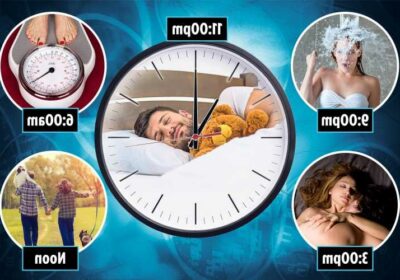The exact time to ask for a pay rise to give you the best chance of securing more money and other life hacks

EARLY to bed, early to rise types have been getting it wrong for all these years But night owls are not doing much better.
Hitting the sack between 10pm and 11pm is optimum for your health, according to research.
A recent study, based on data from more than 88,000 participants of database UK Biobank, says those who go to bed at 10pm or shortly after are less likely to develop cardiovascular disease compared with those who fall asleep earlier or later.
But what about the rest of your daily routine?
If you want to keep firing on all cylinders there is a prime time to exercise, drink coffee, and eat dinner.
Here we reveal how to structure your day according to scientific research.
WEIGH-IN: 6am
The best time to weigh yourself is first thing in the morning, just after you’ve emptied your bladder, because you haven’t consumed any food while you were sleeping.
TAKE VITAMINS: 7am
Water-soluble vitamins (Vit C, B vits and folate) absorb best on an empty stomach, so 30 minutes before breakfast is the best time to take them.
PREGNANCY TEST: 7.30AM
Morning tends to be the best time to take home pregnancy tests, because HCG levels in urine are concentrated after a night without much drinking and peeing.
BREAKFAST: 7.45AM
The best time to have breakfast is within two hours after waking up. Around this time helps boost your metabolism and decreases hunger cravings throughout the day.
SEE DOCTOR: 8AM
Patients who saw their doctors in the morning were more likely to have completed their cancer screening one year later than if they saw them in the afternoon.
LIFE ADMIN: 8.30AM
Levels of the stress hormone cortisol are highest at this time, meaning we have more energy and concentration to tackle those bills we’ve been putting off.
FOOD SHOP: 10.30AM
Three hours after waking is the optimal time to go food shopping as your brain function is at its peak at this time – which combined with a full stomach from breakfast – means you’ll make better decisions when choosing food.
PAY RISE: 11AM
Your cortisol levels are at their highest at this time of the day, meaning you’ll have more energy to make your case and your boss will have enough energy to listen properly.
WALK: 12PM
The sun is at its highest point at noon which means its UVB rays are most intense. That means a brisk 20 minute walk will give your body a good shot of absorbing vitamin D, especially in the summer months.
EAT LUNCH: 1PM
By early afternoon the body’s digestive processes are working at full power meaning you’ll be able to digest food properly and won’t be tempted to overeat as your blood sugar levels will be sufficiently elevated.
COFFEE: 2.15PM
The average Brit loses their mojo at 2.16pm and has less enthusiasm for doing tasks at this point in the day – the perfect excuse to put the kettle on for a caffeine boost.
HAVE SEX: 3PM
Forget morning glory, the best time to get busy is around 3pm. Studies show men and women’s hormones are more in sync in the afternoon.
CLEAN: 4PM
Those who clean the house in the afternoon find it easier because that’s when hand-eye coordination is at its peak and mood levels are high.
EXERCISE: 3-6PM
Your body temperature increases throughout the day, optimising your muscle function and strength, so the body’s window for peak performance occurs in the late afternoon and early evening.
EAT DINNER: 5PM
You should eat dinner around four to five hours after eating lunch. If that falls in the 5 p.m. to 6 p.m. window, you hit the last hour of your body’s heightened metabolic rate before it starts to slow.
BUY SHOES: 6PM
During the day your feet swell up, so to make sure you get the best fit hit the shops in the early evening as your feet will be at their largest around this time.
BEER: 7PM
Many bodily functions slow down in the early evening, so alcohol moves more slowly into your bloodstream than at any other time of the day – meaning you can hold you booze better.
SHOWER: 9PM
A hot shower raises your body temperature and after 15 minutes, it starts to drop slowly. This can promote sleep indirectly, making us feel drowsy and relaxed.
FLOSS: 9.45PM
At night, the mouth doesn’t produce as much saliva, which means food sits between teeth feeding harmful bacteria. If you can only fit in one flossing session per day, your teeth will benefit most if you do it before bed.
SLEEP: 10-11PM
Your heart rate falls along with your stress hormones and body temperature, meaning your body is relaxed and ready for sleep.
Source: Read Full Article






